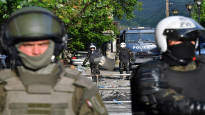According to the NATO-led KFOR crisis management force, the injured peacekeepers are Italians and Hungarians. There are no Finns among the injured, the defense forces confirm to .
The situation in northern Kosovo continues to be tense. On Monday, at least 30 peacekeepers were injured in a clash with Serbian protesters.
Hundreds of Serbian protesters are still gathered in front of the town hall in the town of Zvecan, reports news agency AFP.
Recent unrest stems from the appointment of Albanian mayors in Kosovo. Serbian protesters demand their removal from office.
NATO-led KFOR crisis management forces have surrounded the city hall with riot fences, preventing protesters from entering.
According to KFOR, the peacekeepers have received, for example, burns and fractures caused by incendiary bombs. According to KFOR, the injured are citizens of Italy and Hungary.
The communications of the Defense Forces confirmed to on Tuesday that there are no Finns among the injured peacekeepers.
Finnish peacekeepers have been working in the KFOR operation in Kosovo since 1999. Defense forces tells on their websitethat the total strength of Finns in the operation is about 70 people.
Serbia’s relations with Kosovo, which gained independence from Serbia in 2008, are tense. There are constant disputes between countries about how countries treat each other’s citizens. Serbia has still not recognized Kosovo’s independence.
NATO, the EU and the United States condemn, additional troops are sent
Among others, the military alliance NATO and the EU have condemned the violence. The EU has demanded that Kosovo and Serbia immediately act so that the tension in the region decreases.
The military alliance NATO announced on Tuesday that it will send more troops to Kosovo because of the unrest.
EU foreign policy representative Josep Borrell and the US ambassador have invited the Albanian mayors to a meeting in Pristina to calm the situation.
Researcher: The situation is locked and it is escalating
The conflict in Serbia has a long history, says a senior researcher at the Institute of Foreign Policy Emma Hakala To . According to Hakala, there have been escalated situations from time to time in the last couple of years, but most recently the attacks against the NATO-led KFOR forces caused the international community to react strongly to the situation.
According to Hakala, the current situation is made especially serious by the fact that the demonstrators have attacked the KFOR forces.
Hakala considers it likely that the current conflict will subside.
– Similar disturbances will still be seen in the future, because there is no relief in sight for the difficult relations between Serbia and Kosovo.
It is difficult for Hakala to see the threat of war.
– I believe that the EU and the United States will do everything they can to prevent the crisis from escalating into a war.
The culture of violence is part of the presidential system
According to Reuters, the president of Serbia Aleksandar Vučić is going to meet the ambassadors of different countries on Tuesday because of the events in Kosovo.
According to Emma Hakala, the culture of violence in Serbia is thought to be part of the system maintained by the president, which secures his position.
– It has been thought that Vučić will take advantage of the situation and divert attention from the troubled situation in his own country to the situation in Kosovo.
– The unclear situation in Kosovo benefits Vučić’s position, as he can now appear as a powerful leader, Hakala estimates.
Can Russia confuse in the background?
The connections between the Serbian extreme right and Russia have become closer in the last 10-15 years, says a Serbian researcher Igor Novakovic.
According to Emma Hakala, Russia is a solid supporter of Serbia and is on Serbia’s side.
According to him, however, it can be said with certainty that Russia has not been inciting the current situation between Kosovo and Serbia.
– I don’t think that Russia would send its military forces to Serbia even after the war broke out, because Russia’s main focus is on the war in Ukraine. The situation would be unfavorable for Russia, Hakala states.
What thoughts does the escalated situation evoke? You can discuss the topic until Wednesday at 11 p.m.
